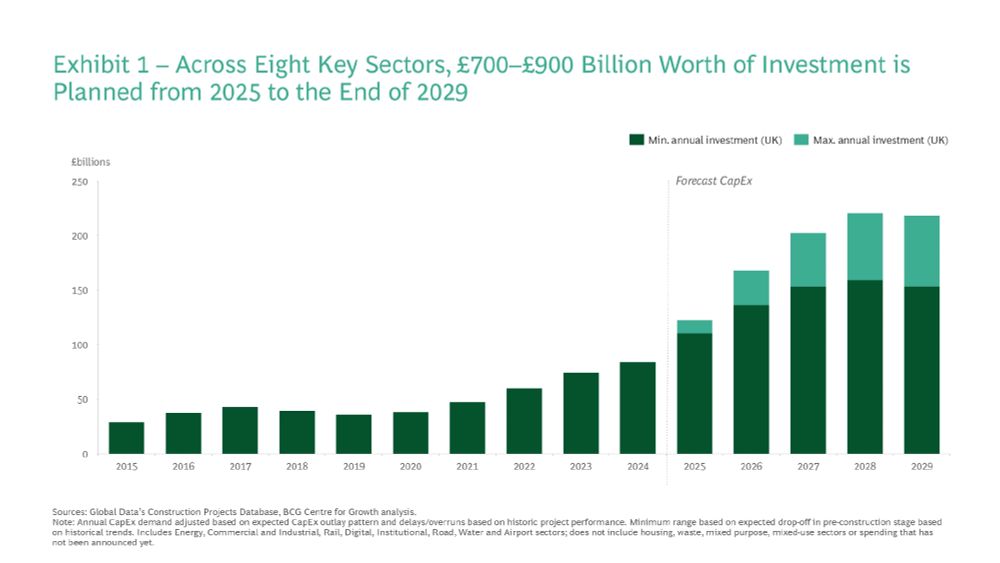
Arthur Downing
@arthurdowning.bsky.social
New blog from me on the only comparison to the AI data centre boom I can think of in electricity history....
The Grid is a perfect example of an anti-fragile asset. A platform that enables optionality. But past generations had better institutions and ownership models...
substack.com/home/post/p-...
The Grid is a perfect example of an anti-fragile asset. A platform that enables optionality. But past generations had better institutions and ownership models...
substack.com/home/post/p-...

The Grid and War
Or the last time something like the AI data centre ‘boom’ happened
substack.com
November 11, 2025 at 9:49 AM
New blog from me on the only comparison to the AI data centre boom I can think of in electricity history....
The Grid is a perfect example of an anti-fragile asset. A platform that enables optionality. But past generations had better institutions and ownership models...
substack.com/home/post/p-...
The Grid is a perfect example of an anti-fragile asset. A platform that enables optionality. But past generations had better institutions and ownership models...
substack.com/home/post/p-...
On why Britain's current energy system is nothing like the Central Electricity Generating Board. It is something new. A Central Return Generating Board.
open.substack.com/pub/energyne...
open.substack.com/pub/energyne...

The myth of the central planner
Misremembering the CEGB (1958-1990)
open.substack.com
June 25, 2025 at 9:26 AM
On why Britain's current energy system is nothing like the Central Electricity Generating Board. It is something new. A Central Return Generating Board.
open.substack.com/pub/energyne...
open.substack.com/pub/energyne...
Reposted by Arthur Downing
The Pensions Review is a great opportunity to boost the UK economy & help savers — but it's being missed.
The state must use its fiscal might to enable better outcomes for both the economy & the public, while policymakers must be innovative & take risks.
www.common-wealth.org/publications...
The state must use its fiscal might to enable better outcomes for both the economy & the public, while policymakers must be innovative & take risks.
www.common-wealth.org/publications...

To Unlock Pension Funds, We Need to Unlock the Pensions Review | Briefing | Common Wealth
www.common-wealth.org
May 29, 2025 at 8:16 AM
The Pensions Review is a great opportunity to boost the UK economy & help savers — but it's being missed.
The state must use its fiscal might to enable better outcomes for both the economy & the public, while policymakers must be innovative & take risks.
www.common-wealth.org/publications...
The state must use its fiscal might to enable better outcomes for both the economy & the public, while policymakers must be innovative & take risks.
www.common-wealth.org/publications...
Why did electricity prices collapse between 1920 and 1940?
In this post I tell the story of the Central Electricity Board - a remarkable, innovative, state owned entity that transformed the industry
It was an engine of abundance
open.substack.com/pub/energyne...
In this post I tell the story of the Central Electricity Board - a remarkable, innovative, state owned entity that transformed the industry
It was an engine of abundance
open.substack.com/pub/energyne...

Engines of abundance
The role of the state in the collapse in electricity prices in Britain, 1920-1947.
open.substack.com
May 4, 2025 at 8:33 PM
Why did electricity prices collapse between 1920 and 1940?
In this post I tell the story of the Central Electricity Board - a remarkable, innovative, state owned entity that transformed the industry
It was an engine of abundance
open.substack.com/pub/energyne...
In this post I tell the story of the Central Electricity Board - a remarkable, innovative, state owned entity that transformed the industry
It was an engine of abundance
open.substack.com/pub/energyne...
“Frenzied”: The first Scottish renewables boom, hydroelectric 1940-1970
My new blog tells the story of a remarkable construction boom that kept the lights on during the 1966 World Cup final. Also includes ‘fish lifts’, zonal pricing of renewables in Scotland!
open.substack.com/pub/energyne...
My new blog tells the story of a remarkable construction boom that kept the lights on during the 1966 World Cup final. Also includes ‘fish lifts’, zonal pricing of renewables in Scotland!
open.substack.com/pub/energyne...

“Frenzied”: The first Scottish renewables boom, hydroelectric 1940-1970
The story of a remarkable construction boom that kept the lights on during the 1966 World Cup final. Also includes ‘fish lifts’, zonal pricing of renewables in Scotland, the origins of ‘Treasury Brain
open.substack.com
April 15, 2025 at 2:55 PM
“Frenzied”: The first Scottish renewables boom, hydroelectric 1940-1970
My new blog tells the story of a remarkable construction boom that kept the lights on during the 1966 World Cup final. Also includes ‘fish lifts’, zonal pricing of renewables in Scotland!
open.substack.com/pub/energyne...
My new blog tells the story of a remarkable construction boom that kept the lights on during the 1966 World Cup final. Also includes ‘fish lifts’, zonal pricing of renewables in Scotland!
open.substack.com/pub/energyne...
Reposted by Arthur Downing
What if the economic chaos from Trump's tariffs is part of the plan? Is there method in the madness, or could it backfire?
This week we demystify the Trump administration's plan to reindustrialise the US and reshape the global trade system: neweconomybrief.net/the-digest/t...
This week we demystify the Trump administration's plan to reindustrialise the US and reshape the global trade system: neweconomybrief.net/the-digest/t...

April 9, 2025 at 9:39 AM
What if the economic chaos from Trump's tariffs is part of the plan? Is there method in the madness, or could it backfire?
This week we demystify the Trump administration's plan to reindustrialise the US and reshape the global trade system: neweconomybrief.net/the-digest/t...
This week we demystify the Trump administration's plan to reindustrialise the US and reshape the global trade system: neweconomybrief.net/the-digest/t...
Building energy grids is slower and more expensive than ever before in British history. New blog.
energynetworks.substack.com/p/building-e...
energynetworks.substack.com/p/building-e...

April 4, 2025 at 10:22 AM
Building energy grids is slower and more expensive than ever before in British history. New blog.
energynetworks.substack.com/p/building-e...
energynetworks.substack.com/p/building-e...
This is a superb report and thread. If we want a playbook for how to do this, it is in our own history. From 1947 to 1979 the British state successfully coordinated a gargantuan programme of infrastructure development (water, gas, electricity) and housebuilding.
🚨New research🚨 out today from us at BCG Centre for Growth – based on current project pipeline next 5 years could see £700-£900bn invested across 8 key sectors. This is 2.1x-2.7x level in past 5 years. Huge opportunity for the UK. But... 1/ www.bcg.com/united-kingd...

February 27, 2025 at 10:15 AM
This is a superb report and thread. If we want a playbook for how to do this, it is in our own history. From 1947 to 1979 the British state successfully coordinated a gargantuan programme of infrastructure development (water, gas, electricity) and housebuilding.
Reposted by Arthur Downing
Finally made the move over from the other place! Starting off with a recent piece I wrote about what the Chancellor needs to do to deliver on growth ambitions. A big part is, focus on delivery & implementation (often the hardest things in govt) (1/2) www.linkedin.com/pulse/easier...

Easier Said Than Done: How the Chancellor Can Deliver on UK Infrastructure and Growth Ambitions
The first job of Chancellor Rachel Reeves’ speech on 29 January was to demonstrate that this government is serious about growth and set a positive way forward for the UK economy. On this, she clearly ...
www.linkedin.com
February 21, 2025 at 12:55 PM
Finally made the move over from the other place! Starting off with a recent piece I wrote about what the Chancellor needs to do to deliver on growth ambitions. A big part is, focus on delivery & implementation (often the hardest things in govt) (1/2) www.linkedin.com/pulse/easier...
I find it intensely amusing that the French nuclear programme in the 1970s used a 0% discount rate. If they had listened to some economists they wouldn’t have any. And now they might lock up AI as well. Maybe we should study more how organisations like EDF actually worked back then
February 11, 2025 at 10:31 PM
I find it intensely amusing that the French nuclear programme in the 1970s used a 0% discount rate. If they had listened to some economists they wouldn’t have any. And now they might lock up AI as well. Maybe we should study more how organisations like EDF actually worked back then
Great to see! renews.biz/98640/ofgem-...
renews.biz
February 7, 2025 at 11:10 AM
Great to see! renews.biz/98640/ofgem-...
A must read!
Just got the exciting news that the Hong Kong-based publisher Consteller will be publishing a translation of 'Mute Compulsion' into traditional Chinese this June, under the title '無聲強制:論資本的經濟權力'!
Today, Mute Compulsion has been out for two years. Huge thanks to everyone who has read, discussed, recommended, criticized, reviewed, edited, cited, published, bought, taught, and translated it. Publishing this book has been a such a wonderful, surprising, overwhelming, and moving experience. 1/3
February 5, 2025 at 10:52 PM
A must read!
End the nightmare
Today, Thames Water is seeking court approval for a £3bn loan at an eye-watering 10% interest rate, paid for by customers.
The public shouldn’t have to bear the costs of Thames Waters’ reckless financial decision making.
🧵 But the good news is, we don't have to — here's why.
The public shouldn’t have to bear the costs of Thames Waters’ reckless financial decision making.
🧵 But the good news is, we don't have to — here's why.
🚨TODAY🚨
Thames Water’s in the High Court today, asking for a £3bn emergency bailout loan. We can’t let this happen.
With Windrush Against Sewage Pollution we’ll submit support for #Thames to go into Special Administration Regime and full public ownership.
morningstaronline.co.uk/article/scor...
Thames Water’s in the High Court today, asking for a £3bn emergency bailout loan. We can’t let this happen.
With Windrush Against Sewage Pollution we’ll submit support for #Thames to go into Special Administration Regime and full public ownership.
morningstaronline.co.uk/article/scor...
February 4, 2025 at 6:39 AM
End the nightmare
Want to know more about the history of energy? Here are three ways of thinking about it with some tips on fun stuff to read. I realize this may have been more helpful before Christmas.
open.substack.com/pub/energyne...
open.substack.com/pub/energyne...

Three ways of thinking about the history of energy
With some tips on fun things to read
open.substack.com
January 25, 2025 at 3:28 PM
Want to know more about the history of energy? Here are three ways of thinking about it with some tips on fun stuff to read. I realize this may have been more helpful before Christmas.
open.substack.com/pub/energyne...
open.substack.com/pub/energyne...
Utterly brilliant piece by Commonwealth
During the energy crisis 51 per cent of profits went to the wealthiest one per cent, while the bottom 50 per cent not only received just one per cent of the total, but ordinary people also bore the higher burden from increased, everyday costs
lnkd.in/eH84BBVX
During the energy crisis 51 per cent of profits went to the wealthiest one per cent, while the bottom 50 per cent not only received just one per cent of the total, but ordinary people also bore the higher burden from increased, everyday costs
lnkd.in/eH84BBVX


January 17, 2025 at 10:10 AM
Utterly brilliant piece by Commonwealth
During the energy crisis 51 per cent of profits went to the wealthiest one per cent, while the bottom 50 per cent not only received just one per cent of the total, but ordinary people also bore the higher burden from increased, everyday costs
lnkd.in/eH84BBVX
During the energy crisis 51 per cent of profits went to the wealthiest one per cent, while the bottom 50 per cent not only received just one per cent of the total, but ordinary people also bore the higher burden from increased, everyday costs
lnkd.in/eH84BBVX
An energy transition requires managing the backwash as well as the bow wave
“The question is how long we put off the inevitable and what we sacrifice the longer we cede control to the profit motive – stability, justice & opportunities to build public wealth”
Our new briefing on the North Sea & public asset ownership in @theguardian.com
www.theguardian.com/environment/...
Our new briefing on the North Sea & public asset ownership in @theguardian.com
www.theguardian.com/environment/...

Bring North Sea oil and gas under greater public control, report urges
Common Wealth thinktank warns that communities and taxpayer may have to pick up pieces when production ends
www.theguardian.com
January 13, 2025 at 5:33 PM
An energy transition requires managing the backwash as well as the bow wave
My thoughts on the essay Foundations. ‘Fixing planning’ is no silver bullet. open.substack.com/pub/energyne...

Without Foundation
A critique of the essay Foundations by Bowman, Southwood and Hughes
open.substack.com
December 16, 2024 at 10:39 AM
My thoughts on the essay Foundations. ‘Fixing planning’ is no silver bullet. open.substack.com/pub/energyne...
When did Britain stop building stuff? Lots of interest in this at the moment. Here is the pattern in energy since 1950. If we are serious about net zero we would the 1950s and 60s are the benchmark.

December 12, 2024 at 8:51 PM
When did Britain stop building stuff? Lots of interest in this at the moment. Here is the pattern in energy since 1950. If we are serious about net zero we would the 1950s and 60s are the benchmark.
"Back then people didn't have deal with NIMBY's". I hear that a lot.
The first ever National Grid involved negotiations with 222k landowners and tenants. The Central Electricity Board appointed thousands of officers to persuade. Astonishingly, only 600 cases (0.27%) needed compulsory purchase.
The first ever National Grid involved negotiations with 222k landowners and tenants. The Central Electricity Board appointed thousands of officers to persuade. Astonishingly, only 600 cases (0.27%) needed compulsory purchase.

December 10, 2024 at 5:20 AM
"Back then people didn't have deal with NIMBY's". I hear that a lot.
The first ever National Grid involved negotiations with 222k landowners and tenants. The Central Electricity Board appointed thousands of officers to persuade. Astonishingly, only 600 cases (0.27%) needed compulsory purchase.
The first ever National Grid involved negotiations with 222k landowners and tenants. The Central Electricity Board appointed thousands of officers to persuade. Astonishingly, only 600 cases (0.27%) needed compulsory purchase.
The crisis of the present was a choice. Incredible analysis.
We can’t understand the geography of capitalism in our present moment without seeing how these old industries overlap with the new.
"Two Towns" features an interactive map showing how ex-industrial towns were not “left behind” but actively made into havens for low-paid work.
"Two Towns" features an interactive map showing how ex-industrial towns were not “left behind” but actively made into havens for low-paid work.
November 27, 2024 at 1:01 PM
The crisis of the present was a choice. Incredible analysis.
That’s what she said

November 21, 2024 at 9:19 AM
That’s what she said
The history of the French water sector since 1848 suggests: public ownership is good for building assets, private operation good for sweating them.
It is interesting that even now while private sector organisations operate the system the investment is publicly funded. Source in comments.
It is interesting that even now while private sector organisations operate the system the investment is publicly funded. Source in comments.

November 18, 2024 at 9:31 AM
The history of the French water sector since 1848 suggests: public ownership is good for building assets, private operation good for sweating them.
It is interesting that even now while private sector organisations operate the system the investment is publicly funded. Source in comments.
It is interesting that even now while private sector organisations operate the system the investment is publicly funded. Source in comments.
“BRITAIN HASN’T BUILT A RESERVOIR FOR 30 YEARS!!!!!!
When did we build reservoirs?
Reservoir capacity grew 82% in the 1950s, 45% in the 1960s, 6% in the 70s & 80s, and just 1% in the 90s, 00s, & 10s
Water was under public ownership until 1989. It has been privatized since then.
When did we build reservoirs?
Reservoir capacity grew 82% in the 1950s, 45% in the 1960s, 6% in the 70s & 80s, and just 1% in the 90s, 00s, & 10s
Water was under public ownership until 1989. It has been privatized since then.

November 17, 2024 at 6:50 AM
“BRITAIN HASN’T BUILT A RESERVOIR FOR 30 YEARS!!!!!!
When did we build reservoirs?
Reservoir capacity grew 82% in the 1950s, 45% in the 1960s, 6% in the 70s & 80s, and just 1% in the 90s, 00s, & 10s
Water was under public ownership until 1989. It has been privatized since then.
When did we build reservoirs?
Reservoir capacity grew 82% in the 1950s, 45% in the 1960s, 6% in the 70s & 80s, and just 1% in the 90s, 00s, & 10s
Water was under public ownership until 1989. It has been privatized since then.

